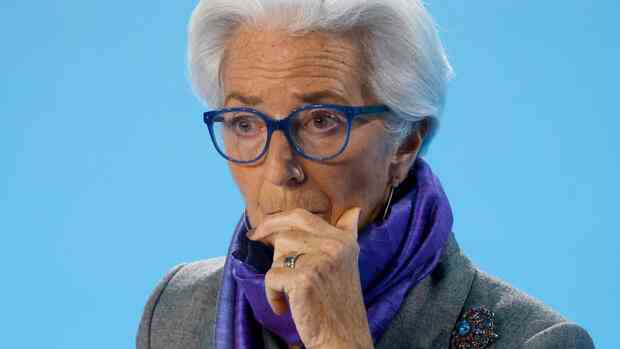The ECB President must keep an eye on inflation and the markets.
(Photo: IMAGO/Panama Pictures)
As expected, inflation in Germany fell again in December – even quite significantly to 8.6 percent compared to 10 percent in November. As expected, there are still warnings that inflation is far from over.
But even if government aid for energy consumers recently played a role, the global trend is ultimately confirmed: the era of high price increases is gradually coming to an end.
However, central banks such as the Fed in the USA and the European Central Bank (ECB) are still in a difficult situation. At the same time, they must ensure that the hoped-for trend continues and avoid unnecessarily burdening the economy.
This could lead them to remain rhetorically tough, but at the same time become far more cautious about their actual actions. So, in the jargon of the money world: talk like hawks, but act like doves.
Top jobs of the day
Find the best jobs now and
be notified by email.
Because their monetary policy works with a time lag of up to a year, it can easily happen that they still push the economy into a recession, while hindsight shows that this should not have been necessary. The central banks would then be accused of reacting twice too late – first to the rise and then to the fall in inflation.
Distribution conflicts drive prices
However, the monetary politicians must not take the risk that prices will get out of control again. Otherwise their credibility would be gone. And that would kill their chance of finding a good balance.
>> Read also: German inflation falls surprisingly sharp – what economists expect for 2023
The Fed, ECB and Co. must therefore also keep a close eye on the markets: if prices rise in hopes of monetary easing, this leads to easier financing conditions and runs counter to the tightening of monetary policy.
To accompany the central banks’ difficult turnaround, a discussion has flared up again – especially on Twitter – about what actually causes inflation. Olivier Blanchard, the former chief economist at the International Monetary Fund, prompted them with the remark that one reason for the rising prices is often distribution conflicts – for example between employees and entrepreneurs.
It’s actually an almost banal remark, but it has caused a surprising amount of opposition.
The example shows that even if inflation ends at some point, we will probably not get rid of the discussion about it anytime soon. The topic is too emotional. One should agree with Blanchard on at least one point: It should be helpful to analyze inflation from as many angles as possible, rather than being content with simple finger-pointing.
More: When monetary policy could become boring again
